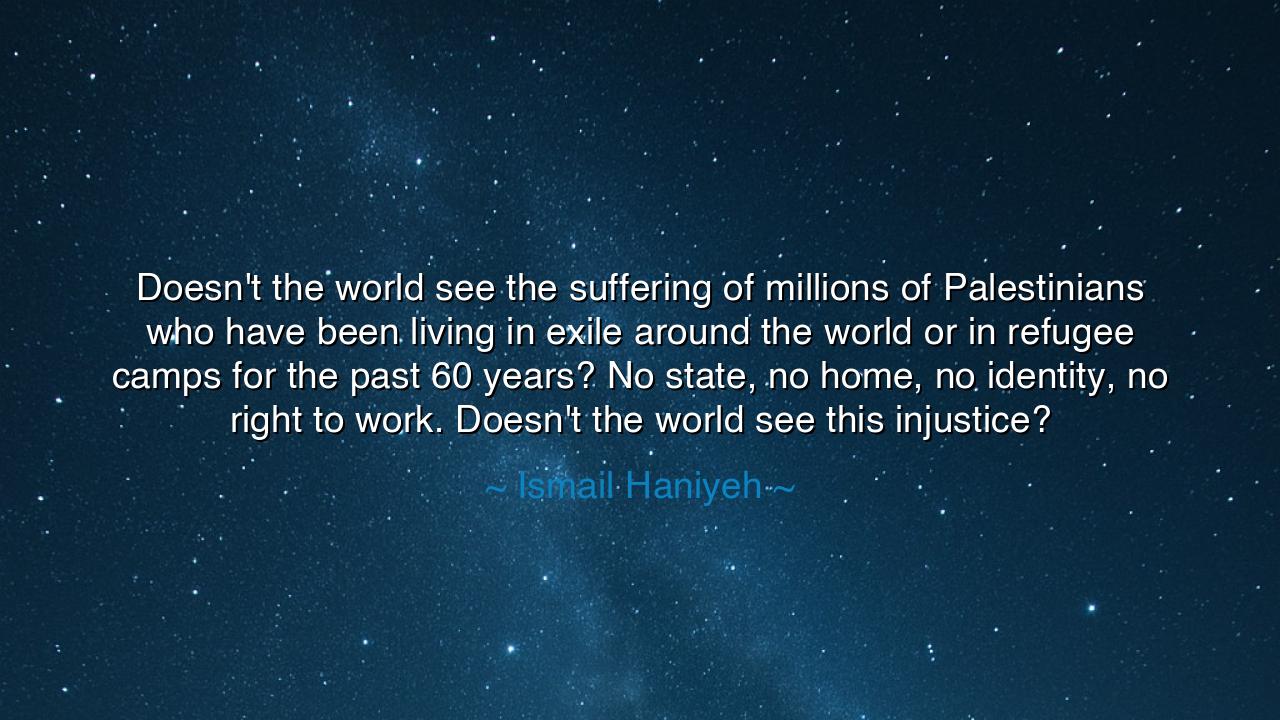
Doesn't the world see the suffering of millions of Palestinians
Doesn't the world see the suffering of millions of Palestinians who have been living in exile around the world or in refugee camps for the past 60 years? No state, no home, no identity, no right to work. Doesn't the world see this injustice?






“Doesn't the world see the suffering of millions of Palestinians who have been living in exile around the world or in refugee camps for the past 60 years? No state, no home, no identity, no right to work. Doesn't the world see this injustice?” Thus spoke Ismail Haniyeh, a voice rising from the depths of grief and endurance, echoing the lament of a people whose exile has spanned generations. In these words burns not only sorrow, but the cry of dignity denied—the ancient plea of the displaced soul to be recognized, to be seen, to be restored. His question, though directed to the world, pierces deeper—it calls upon the conscience of humanity itself, asking: How long can the eyes of mankind remain open and yet blind?
The origin of these words lies in the long, turbulent saga of the Palestinian people, whose history in the modern age has been marked by dispossession, exile, and yearning for return. Since the mid-twentieth century, millions have been scattered across the earth—living not in homes, but in refugee camps, where generations are born beneath the weight of memory. Their story is a wound that has not healed; it is the story of longing for land, for recognition, for identity. Haniyeh’s words do not emerge from politics alone—they rise from ancestral sorrow, from the same soil that once bore olive trees and laughter, now replaced with barbed wire and loss. His lament is that of a father, a teacher, a human being who cannot accept that suffering has become invisible to the comfortable and powerful.
In the ancient world, prophets often cried against the silence of the nations. Jeremiah wept for Jerusalem, saying, “Is it nothing to you, all ye that pass by?”—a cry that echoes across millennia into Haniyeh’s own words. The refugee, like the ancient exile of Babylon, becomes the symbol of all humanity’s moral test. For how a world treats its displaced, its voiceless, and its forgotten reveals the true state of its soul. Empires rise and fall, borders shift and blur, but injustice unaddressed festers into the very soil of the earth. It births new griefs, new wars, and new exiles, until someone once again must ask: Does the world not see?
Yet even in despair, Haniyeh’s words carry the embers of hope and moral awakening. His question is not merely accusation—it is invitation. He calls upon the eyes and hearts of mankind to awaken, to pierce through indifference. He calls upon conscience, that ancient guardian within us, to remember that no human life is less sacred than another, and that the suffering of one people diminishes the humanity of all. To see suffering and turn away is to wound one’s own soul. To witness injustice and remain unmoved is to betray the essence of what it means to be human.
History offers many mirrors for this truth. When the Trail of Tears scattered the Cherokee and other Indigenous peoples from their lands, there were voices who wept and cried out—but too few who listened. When the Armenian people walked through deserts in exile, the world’s silence became complicit. And when the Jewish people suffered their own centuries of displacement and persecution, many nations closed their doors. The lesson repeats through the ages: injustice unseen is injustice repeated. The tragedy of the Palestinians is thus not a singular story, but the continuation of an old human failure—to look upon the pain of others and see not ourselves.
But let not despair consume the heart. The purpose of such words, when spoken with truth and fire, is not to divide, but to awaken compassion. Haniyeh’s question challenges every listener to act—to speak, to build bridges, to demand that justice replace indifference. For no peace, no civilization, can endure upon the suffering of the forgotten. The true strength of a people lies not in their armies or wealth, but in their ability to see and respond to suffering wherever it lives.
Therefore, my children of tomorrow, take this teaching to heart: when you see exile, remember your own home; when you see statelessness, remember your own freedom; when you see the weary and dispossessed, remember that their cries are the measure of your humanity. Do not turn your eyes away. Bear witness, speak truth, and labor for justice even when the world mocks or ignores you. For the destiny of all nations is woven together, and the pain of one people will echo until it is healed by the mercy of many.
In the end, the lesson of Ismail Haniyeh’s words is not only for the Palestinians—it is for the world. It is a warning and a hope. A warning that indifference is the most dangerous weapon of all, and a hope that, someday, humankind will look upon every refugee and say, You are seen. You belong. You are home. Only then will the ancient wound of exile begin to close, and justice—long delayed—will at last take root in the hearts of men.






AAdministratorAdministrator
Welcome, honored guests. Please leave a comment, we will respond soon